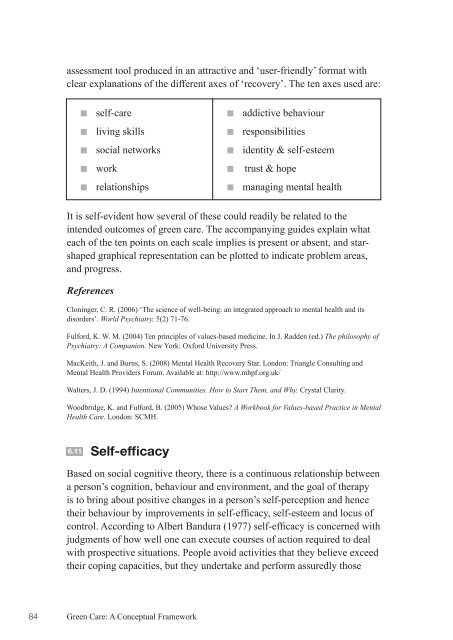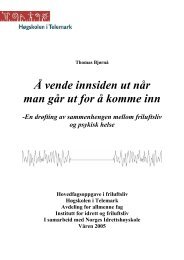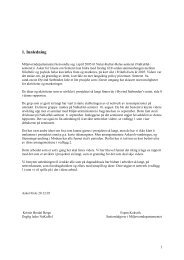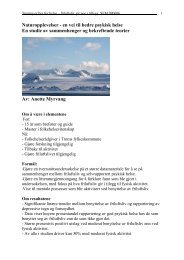Green Care: A Conceptual Framework - Frisk i naturen
Green Care: A Conceptual Framework - Frisk i naturen
Green Care: A Conceptual Framework - Frisk i naturen
You also want an ePaper? Increase the reach of your titles
YUMPU automatically turns print PDFs into web optimized ePapers that Google loves.
assessment tool produced in an attractive and ‘user-friendly’ format with<br />
clear explanations of the different axes of ‘recovery’. The ten axes used are:<br />
n self-care n addictive behaviour<br />
n living skills n responsibilities<br />
n social networks n identity & self-esteem<br />
n work n trust & hope<br />
n relationships n managing mental health<br />
It is self-evident how several of these could readily be related to the<br />
intended outcomes of green care. The accompanying guides explain what<br />
each of the ten points on each scale implies is present or absent, and starshaped<br />
graphical representation can be plotted to indicate problem areas,<br />
and progress.<br />
References<br />
Cloninger, C. R. (2006) ‘The science of well-being: an integrated approach to mental health and its<br />
disorders’. World Psychiatry, 5(2) 71-76.<br />
Fulford, K. W. M. (2004) Ten principles of values-based medicine. In J. Radden (ed.) The philosophy of<br />
Psychiatry: A Companion. New York: Oxford University Press.<br />
MacKeith, J. and Burns, S. (2008) Mental Health Recovery Star. London: Triangle Consulting and<br />
Mental Health Providers Forum. Available at: http://www.mhpf.org.uk/<br />
Walters, J. D. (1994) Intentional Communities. How to Start Them, and Why. Crystal Clarity.<br />
Woodbridge, K. and Fulford, B. (2005) Whose Values? A Workbook for Values-based Practice in Mental<br />
Health <strong>Care</strong>. London: SCMH.<br />
6.11 Self-efficacy<br />
Based on social cognitive theory, there is a continuous relationship between<br />
a person’s cognition, behaviour and environment, and the goal of therapy<br />
is to bring about positive changes in a person’s self-perception and hence<br />
their behaviour by improvements in self-efficacy, self-esteem and locus of<br />
control. According to Albert Bandura (1977) self-efficacy is concerned with<br />
judgments of how well one can execute courses of action required to deal<br />
with prospective situations. People avoid activities that they believe exceed<br />
their coping capacities, but they undertake and perform assuredly those<br />
84 <strong>Green</strong> <strong>Care</strong>: A <strong>Conceptual</strong> <strong>Framework</strong>















